JAXA Astronaut Activity Report, July, 2012
Last Updated: September 24, 2012
This is JAXA's Japanese astronaut primary activity report for July, 2012.
Astronaut Hoshide commences his ISS Expedition mission

Launch of the Soyuz TMA-05M (31S) spacecraft (Credit: S. P. Korolev RSC Energia)

Launch of the Soyuz TMA-05M (31S) spacecraft (Credit: S. P. Korolev RSC Energia)
The Soyuz TMA-05M (31S) spacecraft was launched from the Baikonur Cosmodrome at 11:40 a.m. on July 15 (Japan time), carrying astronaut Hoshide and his crewmates of the Expedition 32/33 mission.
Prior to the launch, Hoshide and his crewmates left the Gagarin Cosmonaut Training Center (GCTC) and moved to the Baikonur Cosmodrome located in the Republic of Kazakhstan, housing launch pads for the Soyuz spacecraft.
At the Baikonur Cosmodrome, the crew conducted the final preparation: an internal check of the Soyuz TMA-05M spacecraft, a leak check of the Sokol spacesuits and confirming the proceedings from launch to docking with the ISS. They also participated in the traditional prelaunch ceremony.
While the crew was busy preparing for the launch, astronauts Wakata, Furukawa, and Onishi gathered at the Cosmodrome in support, serving Hoshide's family and guests and giving a technical explanation to the press.
In Japan, public viewing events were held for the launch in many places. Likewise in the U.S., JAXA held a public viewing event linking Houston, Washington D.C. and New York. In the opening of the U.S. event, astronaut Yui delivered the opening address from the Johnson Space Center (JSC).

Hoshide finds KOUNOTORI3 approaching in the distance (Credit: JAXA/NASA)
Two days later on July 17, Hoshide and his crewmates safely arrived at the International Space Station (ISS) and commenced the ISS long-duration mission. Cooperating with other crewmates, Hoshide is steadily executing a mission including operations involved with the arrival of the H-II Transfer Vehicle KOUNOTORI3 (HTV3).
Astronaut Kanai receives training for the Columbus module at the ESA


Kanai learns FSL operations (Credit: JAXA/ESA-Evi Tabea Blink)
From July 2-11, astronaut Kanai trained at the Columbus laboratory of the ISS, developed by the European Space Agency (ESA) at its European Astronaut Centre (EAC), located in Cologne, Germany.
Kanai trained to gain user-level knowledge of the environmental control system, power distribution/supply system, and thermal control system. After the training, he passed the user level evaluation and was certified as a User of the systems.
Going forward, Kanai learned how to respond to contingency cases involving the systems and the redundant configuration. Kanai was also certified as a Columbus Operator; deemed capable of performing system maintenance and safety treatment.
In addition to the Columbus system, Kanai learned about the onboard payloads on Columbus, Biolab, the Fluid Science Laboratory (FSL), the European Physiology Modules (EPM), and the European Drawer Rack (EDR). He gained an overview, learned the operations specific to each rack, and gained an overview of the installed hardware.
Astronaut Noguchi contributes on the ground during the KOUNOTORI3 launch
On the launch of the H-II Transfer Vehicle KOUNOTORI3 (HTV3) on July 21 from the Tanegashima Space Center (TNSC), astronaut Noguchi communicated with the invited guests.
Viewing the H-IIB rocket approaching the launch pad one day before launch, Noguchi gave a technical explanation on KOUNOTORI3 and rollout of the rockets to the invited guests, who were accredited tweeters for the tweetup event cohosted by JAXA and TV Tokyo's program "SPACE NEWS."
Noguchi also gave a commemorative gift to the invited guests, chosen in a lucky draw from the public godparents of KOUNOTORI.
Astronaut Noguchi speaks at the 2012 JAXA Symposium
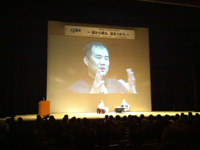
Noguchi speaks at the symposium (Credit: JAXA)
Astronaut Noguchi appeared in a session entitled "People who pioneer space - astronaut Hoshide will fly to space" of the 2012 JAXA Symposium held at the Mielparque hall in Tokyo.
The session commenced with a navigator, Rena Yamada, a freelance announcer and certified weather forecaster. Noguchi discussed JAXA's human space exploration, including astronaut Hoshide's long-duration mission on the ISS.
At the opening, showing a video, Noguchi introduced Hoshide's upcoming mission on the ISS, explaining the mission deploying CubeSats. Noguchi added, "Operating the ISS itself is his mission," emphasizing the importance of performing daily tasks steadily over the long-duration mission, not just the missions attracting public attention.
In response to a question from the navigator about life on the ISS, he reminisced about his mission and explained how changing his daily rhythm to prepare for the arrival of a spacecraft made him exhausted, since the crew on the ISS normally has a fixed routine. He also told how he spent holidays photographing Earth.
During the session, time for asking questions was allowed. Noguchi answered various questions, concerning e.g. experiments conducted on board Kibo and the attitude to be an astronaut. Noguchi proposed a cross-cultural exchange as one of the qualifications to be an astronaut, commenting "I guess there should be a range of culture, even in a school classroom. It's important to get along with each other and cooperate for the same goal," yelled at children wishing to be astronauts.
Noguchi discussed how this year marked Japan's 20th anniversary since astronaut Mohri's first space flight. He reflected on Japan's history in terms of human space development and commented "Although Japan strives continuously, its acknowledged achievements are sporadic." Additionally, Noguchi shared his thoughts, "In future, I wish to create an original Japanese robust manned spacecraft, complementing humans and machines and featuring a combination of operational techniques acquired by JAXA astronauts and Japanese robot technology."
New Astronauts at the Front-Line

One year has passed since I became an astronaut. I am grateful for the opportunities given to me to have various experiences.
As I have said on Twitter, this has been a very fulfilling year. Because during the year there happened as many as three incidents that would change my life.
The first one is the passing away of my mother. She was always energetic and cheering me up, but suddenly died of overwork. She was one of a few women who would give me harsh criticism. It is an immeasurable loss to me, but I am going to try to overcome it and hang on.
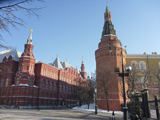
Streetscapes in Russia were very beautiful. However, even more than that, I was moved by the beautiful hearts of the Russian people.
The second one was my studying abroad in Russia. To be honest, I did not like Russia very much under the influence of my previous job. The country was mysterious to my eyes, whose behavior was incomprehensible. Given this backdrop, I had opportunities to meet many Russians to come to realize the mistakes in my idea I had in the past. I got ashamed of myself having disliked the people without knowing them well. From that time on, I have been learning their language, culture, and history really hard to understand Russia. When it comes to relations between countries, win-win relationships are important with mutual understanding and mutual support. I have found that many of the Russian people I have come into contact with are friendly to Japan, and amicable as well. What on earth is preventing mutual understanding -- to find out the answer to it has become one of my dreams I would like to realize in the future.
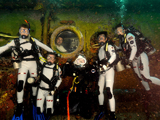
Group photo of the crew. The experiences I had while learning in NEEMO16 will mean a lot in my future career as an astronaut.
The third one was my taking part in NEEMO16. This also changed my idea. It made me reconsider about manned asteroid exploration, of which I have had a negative view because of ignorance. I strongly felt that, when making a judgment about something, I should not do it based on biased information but try to formulate a judgment based on balanced information as much as possible. Now, I have become able to say an unbiased opinion with the knowledge of both moon and asteroid exploration. In addition, as I could successfully fulfill the responsibility as a crew member by overcoming the tight schedule, the complicated mission and the language barrier, I feel I have grown a lot. One of the reasons I could overcome the obstacles may be related to the fact that I have a background as a test pilot. The work of a test pilot is to make assessments of something new or some new concept. The mission this time was just like such a kind of work, so I was in my element like a TURTLE in water (as one of the Chinese characters in my name signifies a turtle).
These three incidents had and will keep on having great influences on my idea about life and my activities from now on.
Oh, I have changed in another respect as well, as an aside. I recently successfully restored my slender body which once gained extra fat gradually during my life in the USA.
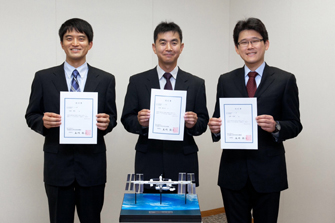
A year ago. Three freshmen who had just been certified as astronauts.
To tell you the truth, I was gaining fat around my belly little by little then.
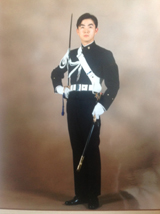
I was once slim like this! (lol)
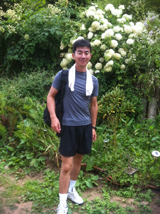
Worked out hard to build up my body again.
Maybe not slender enough, but am I looking well for my age?
I took six months to streamline my body little by little, and nearly restored the body figure I had in my college days (I actually increased my muscle mass since my college days). I had been unable to do such a thing before because I took it for granted to be impossible in my mind. I have learned that the greatest barrier against achieving something lies nowhere else but in my mind. And this realization was a significant benefit I reaped.
Anyway, my first year as an astronaut has been very fruitful. Into the second year, I would like to continue taking on new challenges just like the first year so that the second year can also be perceived as another fulfilling year. Let's construct a bright future for Japan together! -- If you are young, try to keep up with me, a 42-year old guy, or if you are in the same generation as me, hang out together with me.
* Sources of photos: NEEMO16 photo by courtesy of JAXA/NASA, others by JAXA.

"A hometown is what you think of from far away.
and what you sing a song sadly for"
The poem that begins with the above passages was written by poet Saisei Murou. Aside from the interpretation of what kind of thing the hometown was for Saisei, there is no doubt that the country of Japan in its entirety is now my hometown or home country that I recall from time to time on foreign soil here in Houston, USA.
"Where are you from?"
This is a question I have long had difficulty in answering every time I was asked.
I wonder where I am from...If it literally means my birthplace, it is Tokyo. According to Wikipedia, it is likely that I am from Tokyo. It seems that the description perhaps comes from my birthplace.
Then, taking a look at JAXA's official website to see what it says about me, I find a "Born in Tokyo" description in my profile. As is expected, JAXA writes only the facts that are considered to be accurate.
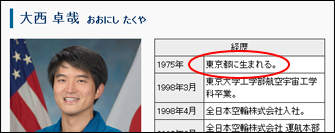
I see. Then, how about Mr. Yui?
"Born in Nagano prefecture"
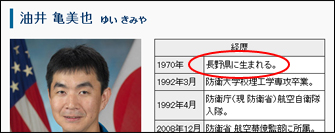
Right. Of course he was. Mr. Yui was born in Kawakami village, Nagano prefecture. Then, how about Mr. Kanai?
"Born in Tokyo and then brought up in Chiba."
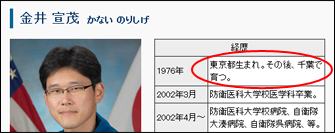
Oh! what an apt expression!
Yes, like his case, the hometown is sometimes a complicated issue for a person who was born in one place and brought up in another.
Born in Tokyo, I grew up in several places moving around in Japan because of my father's career.
Hyogo, Osaka, Hyogo again, Okayama, Tokyo again, and Yokohama. In particular, Okayama, where I spent my boyhood between the third to fifth grade in elementary school at the sensitive age, and Yokohama, where I spent six years as a student of a private integrated junior-and-senior high school are full of my sweet memories.
Without any piece of the time I spent in all these places, there might not be my present self. When thinking in such a manner, I can hardly select any one place as my hometown. So, expression like
"Born in Tokyo and brought up in various places"
sounds the most suitable to me.
Having such undefined hometown, once out of Japan, I become recognized invariably as an unwavering "Japanese" identity. In addition, there are people around me from various countries, such as Americans, Russians, and Canadians.
I think one of the pleasures of the career as an astronaut is that I can work together with astronauts of various nationalities.
And through the training and life in the USA, I often have new findings about Japan or the USA.
The other day, there was this finding:
I love watching sports, though do not like doing myself most kinds of sports very much. I especially like watching Olympic games and Japanese high-school baseball games. It is not too much to say that I would prefer watching such games to having three meals a day.
Such being the case with me, this summer was really a so-to-speak once-in-four-year festival season which had both the Olympics and high-school baseball games at a time.
Sadly however, there is no way for me to watch Japanese high-school baseball games here in America, and it is not easy to cheer for Japanese athletes, either. My training schedule happened to be quite tight during the period. So I was merely seeing Olympic results on the Net every day.
One day, I was watching a sports news program on TV while pedaling an exercise bike in the astronaut gym in NASA. Of course, the news topics were mainly about the London Olympics.
After the results of respective events were reported, a list of standings of medal count by nation appeared on the screen. I am not sure I remember accurately, but I think Japan had gotten two gold medals by that time, and it was ranking somewhere a little bit lower than the tenth around that time.
In descending ranking, the then first place China and the second place USA appeared. Then the third... To my surprise, Japan appeared. What happened with this? After wondering just for an instant, I got it. The ranking shown was not by gold medal count but the combined total of all types of medals. In this respect, Japan was without doubt in the third place as of that day.
Amazed by the unexpected showings, I continued pedaling for a while, watching at the TV screen. Ever since I came to the USA, I have felt many times here that this is a country of meritocracy by seeing actual examples. In such a country, the USA, the fact surprised me that any type of medal, be it gold, silver, or bronze, was counted as one medal on equal terms. There was nothing to do with the color of medal. I felt the attitude of simply paying respects to the athletes who did their best. On the other hand, alas, I had been obsessed by the concept that the medal count ranking was determined solely by the number of gold medals acquired.
I felt I saw some other aspect of the country of America that I usually do not see.
I may have dwelled on this story too long , regardless of its having nothing to do with training. However, I decided to write this because I myself was given tremendous courage by the good showing of the athletes of team Japan. Though I am in a field different than sports, I would like to do my best as a member of the Japanese astronaut team.
Incidentally, regarding the poem I cited in the beginning. I have long misunderstood it as a poem expressing a nostalgic feeling, longing for a hometown, but while writing this I have just found it not to be that simple. Subsequently to the initial passage comes the passages meaning a hometown is not a place to go back to. What hometown was it for Saisei Murou...my interest in the question will never

Hello, everyone. I am Norishige Kanai, a freshman astronaut in training living out of a suitcase.
Our training in July was carried out in the European Space Agency (ESA). From Houston, a place of everlasting summer, I flew over the Atlantic Ocean to Cologne (Koln) in Germany where pre-summer refreshing air can still be felt. About 20 minutes driving from the center of the city well known for its cathedral toward south is the German Aerospace Center, where the European Astronaut Centre is located. As its name signifies, it is used as a base on which astronauts from various member countries of the European Space Agency undergo training. The facility receives astronauts from countries all over the world, such as the USA, Russia, and Japan for training.
Just like Japan is operating the Kibo Japanese Experiment Module as part of the International Space Station, Europe is operating its own laboratory module dubbed "Columbus" around the clock. This month, I had training for working as an astronaut in this Columbus laboratory.
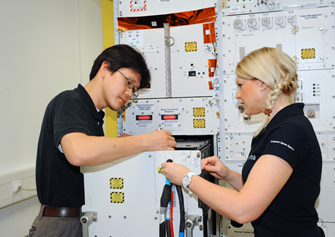
Although the Columbus laboratory needs to draw the required resources such as electricity and air from the USA-managed section, the Columbus has the necessary functions to serve as a little space station on its own -- functions with which the Columbus independently distributes electricity and circulates air for use within it, regulates the room temperature and humidity to keep them optimum for human activities. It is also provided with computing facilities for performing scientific experiments in space and controlling such activities. We astronauts should be prepared for various possible system troubles so that we can take necessary measures in the event of such a trouble under instructions from the control center in Munich (Munchen).
I will partially unveil the information I am going to keep for the next-month material. In the training scheduled to be performed in August related to the Kibo Japan Experimental Module, I will have to learn about a little (or quite?) complicated special systems such as Japan's original robotic arm and the air lock to be used as a gate through which things are taken from the vehicle to the space and vise versa. So, the opportunity I had in the Columbus system which is relatively simple to solidly learn the basics of the space station was valuable.
The instructors and staff members in the European Astronaut Centre are excellent engineers from European organizations in various countries. Japanese people tend to see those European countries as a single entity, Europe, but each country has its own history, language, and culture. The atmosphere in which such people work together toward one common goal while respecting and accepting one another's country backgrounds looked great and really befitting to the operation of the "international" space station to my eyes.
Looking back, since I started working for JAXA, the concept of "world" to me has been expanding day by day. Before I became an astronaut, the extent to which I could actually feel as the field of my daily life or work was within Japan at most. When I thought about foreign countries, just American scenes I had seen on TV or in Hollywood films came to my mind and that was all.
When I was selected as an astronaut candidate and started training in Houston, I had an opportunity to undergo training with American astronauts. Having conversation in English in my daily work, using my faltering English, I felt as if I were an internationally active worker. But I now think back that I just had an oversimplified image of "America equals the world."
After that, I was certified as an astronaut, came to visit various places in the world such as Russia and European countries, and I leaned and felt that there is a wide range of ways of thinking and feeling about things in the world through my hands-on experiences.
JAXA is currently in international cooperation with Asian countries for space development. I think such cooperation must have something unique to Asia, not seen in that of America, Russia or Europe, about the efforts and ideas toward space development.
The space station is currently being operated in a joint effort by the USA, Russia, Japan, Europe, and Canada, but in the future countries in the South America, Middle East, and Africa might possibly join to form a totally new space development effort.
Space development began as a competition between the two super powers, America and Russia. However, gone are the days when each country individually spent tremendous expenditure trying to attain the foremost position in the world with leading-edge technology. Now, a framework is afoot in which countries cooperate with one another to attain a common big goal of the human being, each making a contribution on their own respective ground.
International cooperation in general sometimes involves difficulties because of political or economic interests of individual countries. I think the space development, however, is a successful example of an "ideal relationship of international cooperation" where one behaves assertive in one area and gives way to others in other areas in an appropriate manner.
One of the reasons of the success is, I personally consider, that Japan who has the spirit of valuing harmony as part of its cultural background is playing a major role in this joint effort.
In order that I can carry out my duties as a "Japanese" astronaut in the space station well, I think it is important for me not only to acquire the necessary technique and knowledge but also to directly step into the space-development arenas of various countries and accumulate various experiences there.
* Photo by courtesy of JAXA/ESA-Evi Tabea Blink.


















